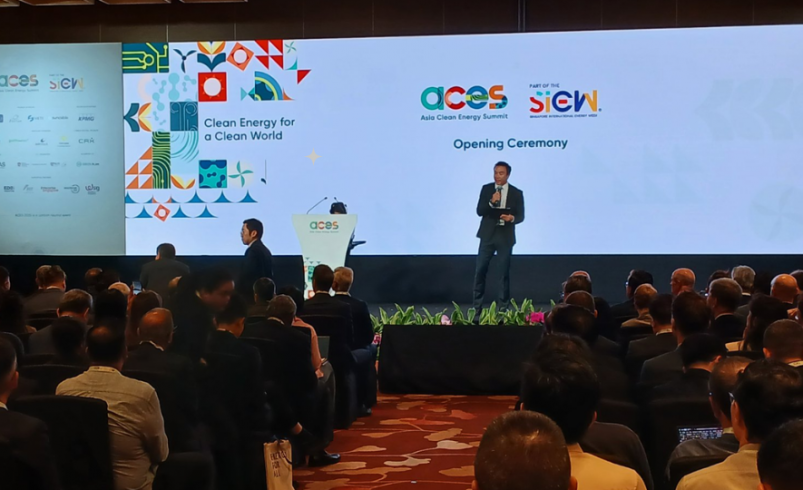Decarbonization and development can power progress together, says First Gen
- November 3, 2025
- 0

In photo: First Gen Vice President and Head of Strategy and Planning Jay Joel L. Soriano speaking at the Asia Clean Energy Summit (ACES) 2025
Rejecting the false choice between growth and climate action, First Gen Vice President and Head of Strategy and Planning Jay Joel L. Soriano said the company’s decision to divest from gas and avoid coal proves that “decarbonization and development are not opposing forces—they are partners in progress.”
Speaking at the Asia Clean Energy Summit (ACES) 2025 held in Singapore last week, Soriano said the world can no longer wait until 2050 to act. “The positive benefits of 24/7 renewables don’t have to wait until 2050. We need to deliver value now—jobs, resilience, cleaner air, and hope,” he said.
He noted that global warming has already reached alarming levels. According to the World Meteorological Organization, there’s a 70% chance that the five-year average warming between 2025 and 2029 will exceed 1.5°C.
“We already crossed that threshold for the first time in 2024. We are living in the decade that will decide our planet’s trajectory,” Soriano said.
Reliable, 24/7 clean energy
Soriano emphasized that the challenge lies in balancing affordability, security, and sustainability.
“The energy sector is both the source and the solution. It accounts for three-quarters of global emissions,” he said. The goal, he added, is to build reliable, 24/7 clean energy systems that can keep the lights on while cutting emissions.
Globally, renewables now supply 30% of electricity, while battery storage doubled in 2023—a sign that the transition is accelerating. But power demand is also rising fast. Artificial intelligence, digitalization, and data centers have pushed electricity use up 12% per year over the past five years. In the Philippines, data center demand could reach 500 MW by 2028 and 1 GW by 2029.
The Philippine Challenge
Soriano said the Philippines’ current energy mix still reflects “unfinished work.”
As of 2024, 63% of electricity comes from fossil fuels, while renewables account for only 22%, and natural gas 14%.
Momentum is building, however. The country added 794 MW of new renewables in 2024—more than the previous three years combined.
He cited the government’s Green Energy Auction Program (GEAP), which attracted 9.4 GW of bids, nearly meeting its 10.6 GW target. But Soriano stressed that regulations still need to catch up with the country’s goals. He pointed out that the Energy Regulatory Commission (ERC) still uses a fossil fuel pricing model for geothermal energy, which he likened to “asking a marathoner to race under sprint rules.”
Soriano called on regulators to recognize geothermal’s unique value—its upfront capital intensity, baseload reliability, and long lifetime service. “When frameworks recognize all clean technologies have a role to play, capital will flow and unlock the potential for a 24/7 renewable grid,” he said.
Collective action
Soriano underscored that technology alone isn’t enough. In 2021, First Gen subsidiary Energy Development Corporation founded the Net Zero Carbon Alliance, now joined by over 40 companies from aviation, manufacturing, finance, and education. The alliance helps members through carbon accounting, renewable procurement, and transparent reporting.
“It’s our way of practicing bayanihan,” Soriano said. “No company can do this alone. Our greatest renewable resource isn’t only found in nature—it’s found in people.”
The Roa
Soriano said that scaling up 24/7 renewables requires progress on five fronts:
“The journey to net zero isn’t just about 2050—it’s about making every year along the way better, cheaper, and more resilient,” he said.
Follow Power Philippines on Facebook and LinkedIn or join our Viber community for more updates.